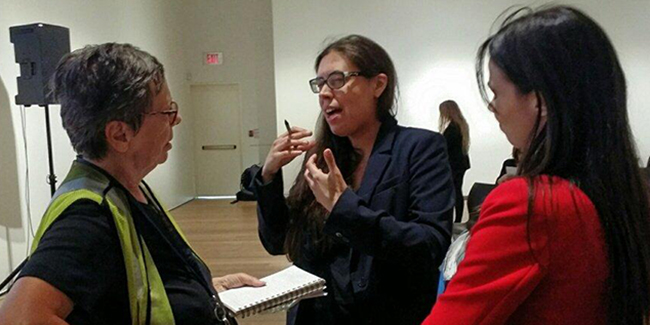‘A lot of assimilationist policies obviously impacted my life’

By Barb Nahwegahbow
TORONTO – Christine Migwans has a passion for both developing and reading theory related to colonialism, Indigenous people and genocide. “Anti-colonial theory does a lot to diagnose colonialism,” she said. It’s liberating for Indigenous people, “and it’s highly useful for my daily life,” she continued, “I truly feel it is destabilizing colonialism.” She was speaking in an interview following a talk on August 12 at Toronto’s Gardiner Museum, hosted by the Feminist Art Museum.
A citizen of M’Chigeeng First Nation, Christine didn’t grow up there. She was born and raised in Toronto. Her mother was taken by child welfare authorities and was adopted into a non-Indigenous family. Christine’s grandmother was a Residential School Survivor.
“Most of the Indigenous people in Toronto have the same kind of story I do,” Migwans said. “A lot of the assimilationist policies obviously impacted my life.”
At the age of seventeen, Migwans made the decision to explore her indigeneity. “I had to do it,” she said, “so when I have kids, my kids will have a parent with no identity issues, a parent who’s probably a language speaker who will have competency. I feel proud of myself. I also did it for my family because I figured they weren’t able to do it for themselves and that’s okay.”
“People were open and really cared about whether or not I was connected to my indigeneity and took time to be my friend,” Migwans remembers.
Migwans gets excited when she talks about the community. She has nothing but positive feelings and positive things to say about the Indigenous community and shows a wisdom usually found in someone much older than thirty-two. “I only see excellence. I only see strength. I only see the way they survive. I only see their beauty. When people are laterally violent in the community, I just give them space and I know we can work it out. I’m bound to the community forever so whatever they need me to do for them, that’s my job.”
“If I have some negative experience,” Migwans said, “right away, I feel it, then I dismantle it, I destabilize it. I go right back to the truth of what I see community doing. We are saving the world. We are saving the whole planet through our culture. I see us as constantly being in service to the rest of humanity and I feel really good about this.”
Migwans’ talk at the Gardiner was titled, Why Indigenous Knowledge Matters: Creating New Moral Fabrics in Settler Colonial Societies. Over 150 people of all ages, mainly non-Indigenous, attended her talk, a huge audience according to the organizers.
Included in her presentation was discussion about the need for subversive activity as a strategy to negotiate colonialism and to counter its effects. Indigenous artists Including A Tribe Called Red and the late poet-activist John Trudell are telling stories in their work that are deep Indigenous expressions of memory and place. “They’re subverting the narrative of place, about what place means, and about what memory of place means,” she said.
Migwans later said the only answer for her when there’s too much colonialism, “is to go deeper into my indigeneity, go deeper into my prayers, go deeper into awareness of my being as an Indigenous person.” She’ll go into the Sweat Lodge which she describes as “the most beautiful thing I’ve ever experienced. I have control over reality and I can choose a practice that is a different reality.” By their very nature, engaging in ceremonies is subversive, she said, because they dismantle colonial reality.
Christine Migwans holds two degrees in Indigenous Studies from Trent University. A defender of Indigenous rights, researcher and playwright, she has worked with Indigenous people across Canada and in southeast Asia.


